
views
- Fill out a marriage license application from your county clerk’s website and go with your partner to the county clerk’s office to turn it in.
- There’s a 72-hour waiting period after you get your license before you can get married, except for active military and couples who had premarital education.
- Have your ceremony within 90 days of receiving your marriage license, either at the courthouse or with a qualified wedding officiant.
- Make sure your officiant fills out your marriage license and returns it to the county clerk’s office within 30 days so that your marriage is recorded.
Obtaining a Marriage License

Apply for your marriage license at least 72 hours before your wedding. Unless you meet certain requirements, you won’t be able to get married right away. In Texas, there’s a 72-hour waiting period before you can get married. Plan ahead so your wedding goes off without a hitch. You can skip the 72-hour waiting period if you’re in the military and deploying to a hostile zone or you and your partner took a premarital education course. To skip the waiting period and save money on your marriage license, take a premarital education class. To find a class near you, visit the Twogether in Texas website. Same-sex marriages are legal in Texas and the process is the same regardless of the couple's genders.
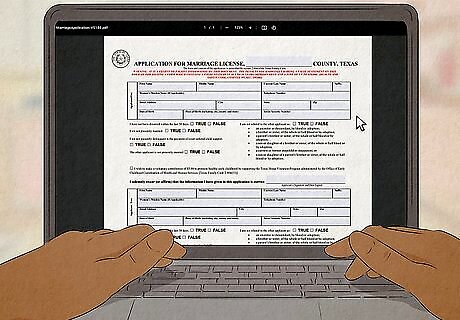
Fill out the application for a marriage license. Use the online application for the county where you’re applying for your marriage license. It’s a super easy form, so it only takes a few minutes. You can submit your application online, but you’ll still need to appear before the county clerk with your partner. Fill out your name, address, birth date and location, and whether or not you’ve gotten divorced in the past 30 days, are married, are delinquent in child support, are related to your partner, or are in the military. After filling out your application online, you and your partner will need to go to the county clerk’s office within 3 days to get your marriage license. If you don’t, your application will leave the queue, and you’ll need to fill it out again.
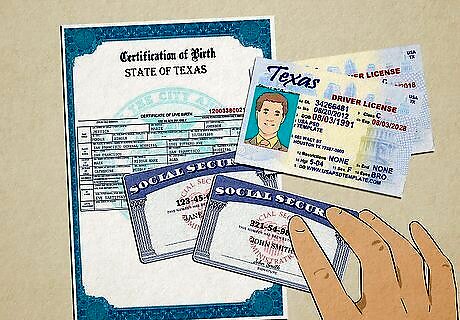
Bring your social security card and an approved form of ID. In Texas, you have to prove who you are and how old you are before you can get a marriage license. Luckily, you probably have the documents you need within easy reach. Take your social security card and one of the following: Your valid, unexpired driver’s license. Your unexpired government-issued ID (from any state or country). Your passport. Your certified copy of your birth certificate. Your military ID.
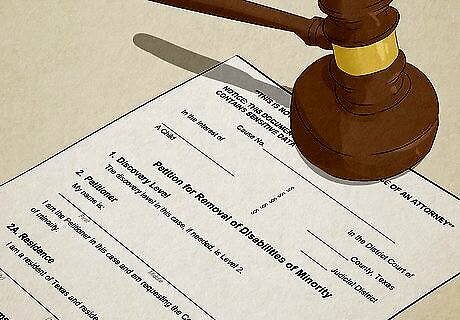
Get a court-order if either partner is under the age of 18. Texas has laws to protect children who are being pressured into marriage. As of 2017, people who are under age 18 must get a court-order for emancipation from a judge before they can get married, even if they have permission from their parents. To be emancipated, you must be 17 years old or 16 years old but living separately from your parents, supporting yourself. Each county has its own forms that you’ll need to fill out. Additionally, you’ll have a lawyer appointed to you to help you through the process.

Go to the county clerk’s office with your partner. Texas law requires that you and your partner get your marriage license in-person. You and your partner will go before your local county clerk so that the clerk can make sure that you’re the person on your identifying document. Find your county clerk’s office here. Absent Applicant: You or your partner can have someone appear on your behalf with a signed, notarized affidavit from the absent partner, along with an approved ID for the absent partner. However, the absent partner must be at least 18 to use this exception. Military Exception: If both partners are deployed overseas, they’re allowed to both send proxies in their place to apply for a marriage license, as long as the proxies can prove that the couple are both active military.

Pay your marriage license fees. Marriage license fees are set by each county. They usually cost between $67 and $84, depending on which county issues your marriage license. Payments are typically accepted in cash, debit card, or credit card. Military Benefits: If either partner is active military and deploying to a hostile zone, your marriage license fee will be waived. Premarital Education Class Discount: If you took a premarital education class, you’ll receive a $60 discount on your marriage license fee.
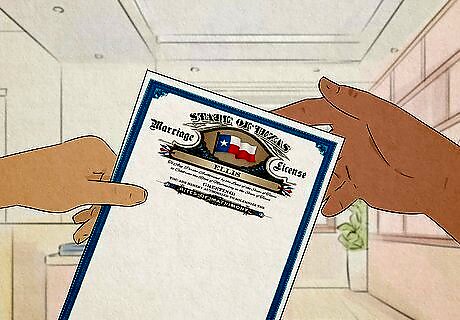
Receive your marriage license from the county clerk. Once the county clerk processes your application, they’ll print out your marriage license right away. It’s time to celebrate because you’re one step closer to walking down the aisle. Snap a pic because you’ll want to remember this special moment. Some county clerk’s offices have a “photo booth” set up where couples can take an Instagram-worthy photo with their marriage license.
Having a Ceremony

Get married within 90 days of receiving your license. After the county clerk issues your marriage license, it’s valid for 90 days. If you don’t get married before it expires, you’ll have to apply for a marriage license again. Set your wedding date for sometime in that three-month window. If you’re unable to get married for some reason, you can totally get a new marriage license when you’re ready to set a new date. You’ll just have to repeat the process again and pay the fee.

Choose a qualified wedding officiant. Picking your wedding officiant is a special moment because this person is going to play a special role on your wedding day. You could even ask a friend or family member to get ordained as a wedding officiant so they can do it. In Texas, you can get married by: An ordained or licensed minister or priest. A rabbi. A religious authority of another faith. A judge. A justice of the peace.

Plan your wedding ceremony. In Texas, there are no rules about how you conduct your ceremony. You, your partner, and your officiant can work together to write the ceremony and vows that you’ll exchange. Usually, your officiant will write a draft of what they plan to say for you to look over. If you want to make changes, you can. After all, this is your day!

Attend your ceremony in person. Unless you’re active military personnel, you must be at your wedding in person for it to be legal. Chances are, you were planning to be there anyway, but we still wanted you to know about this rule. If you’re in the military and deployed to a hostile zone, you can have a proxy stand in for you at your wedding. In the past, incarcerated people could also marry by proxy, but Texas changed its laws. Now, you have to get married in person at the prison.

Have a courthouse wedding for a quick, inexpensive option. Skip all the planning and jump directly to your special day by going before a judge. Some Texas counties require you to schedule an appointment for your wedding, so check your county’s website. In some cases, judges will take walk-ins if their schedule allows. Each judge sets their own fee for conducting a courthouse wedding, but they’re typically pretty low. You can expect to pay around $100. You don’t have to have witnesses for a wedding in Texas, but you’re allowed to invite guests. Ask someone to take photos or hire a photographer. You can always have a reception with your friends and family after your wedding ceremony.
Finalizing Your Marriage
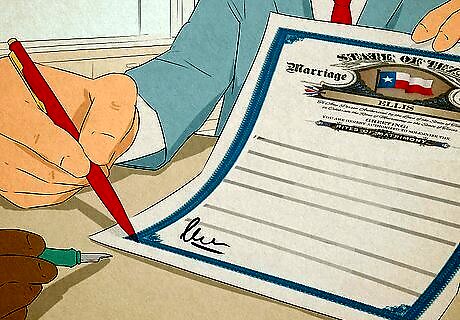
Ask your officiant to fill out your wedding license. Congrats on your nuptials! After your wedding ceremony, your officiant will record when you got married and sign off on your marriage. It only takes a few minutes, but it’s super important that you get the license signed. If you picked an officiant who’s done weddings before, they’ll probably do this right away without you asking.
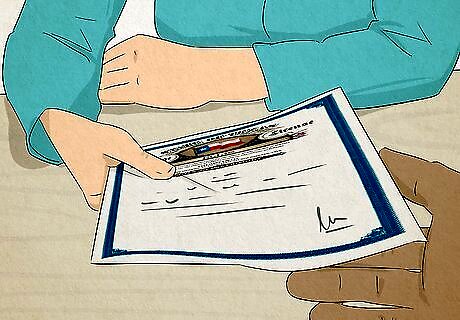
Return your wedding license to the county clerk within 30 days. In most counties, you can mail your license or bring it back in-person, depending on what’s easiest for you. The county clerk will process the license when they receive it. Once it’s recorded, you’re legally married. If you’re leaving for your honeymoon right away, mailing the certificate might be your best option. The finalized license might even be waiting for you in your mailbox when you get home!
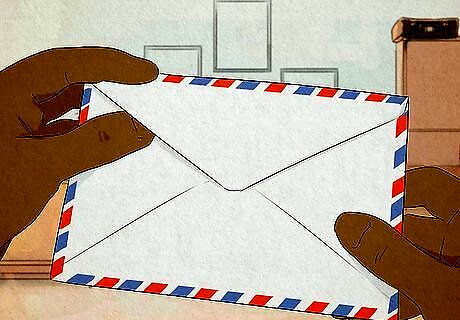
Receive your final license in person or by mail. If you mailed your license, the county clerk will usually return it to you in a few weeks. If you take your license in person, they’ll hand it back to you after recording it. Keep your marriage license because it’s your proof that you and your partner are legally married. Some county clerk’s offices sell commemorative marriage licenses that you can frame. While they aren’t legal, they make a sweet keepsake of your special day.
Getting Common Law Married

Meet the requirements for common law marriage. Contrary to popular belief, you don’t have to be a couple for a long time to get common law married in Texas because there aren’t any rules about relationship length. Make sure you and your partner meet these requirements: Both partners must be 18 years old. You must agree to be married. You agree to live together as spouses. You represent to others that you’re married.
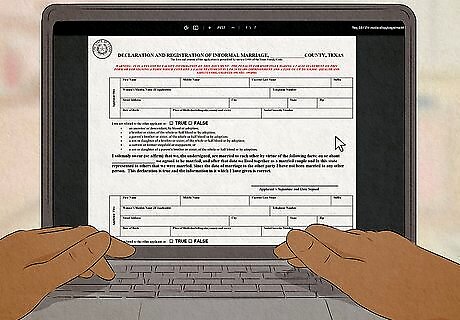
Fill out an informal marriage license application. It’s super easy to get common law married. All Texas counties use the same application. Provide your personal information, and verify that you aren’t related by blood or by marriage. Then, sign on the line agreeing to be married and live together from now on. Leave the bottom of the form blank for the county clerk’s office to fill out.

Submit your application to the county clerk’s office. Like with a normal marriage license, you’ll need to appear before the county clerk with your partner. The clerk will sign off on your informal license and check your ID and age. Find the closest county clerk’s office here.

Pay your informal marriage license fee. There’s a low processing fee to complete your application. You’ll pay the fee to the clerk, usually in cash or by debit or credit. Give the clerk your payment, then take your completed license. The fees for an informal marriage license are less expensive than a regular marriage license. Each county sets their own fee, but they’re usually under $50. Some are as low as $32.



















Comments
0 comment